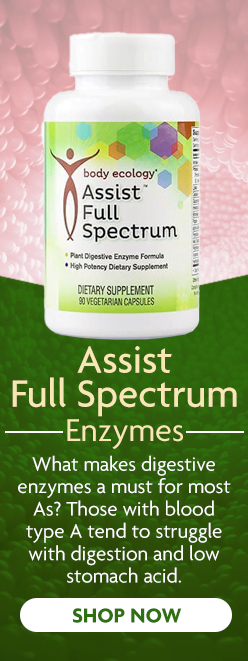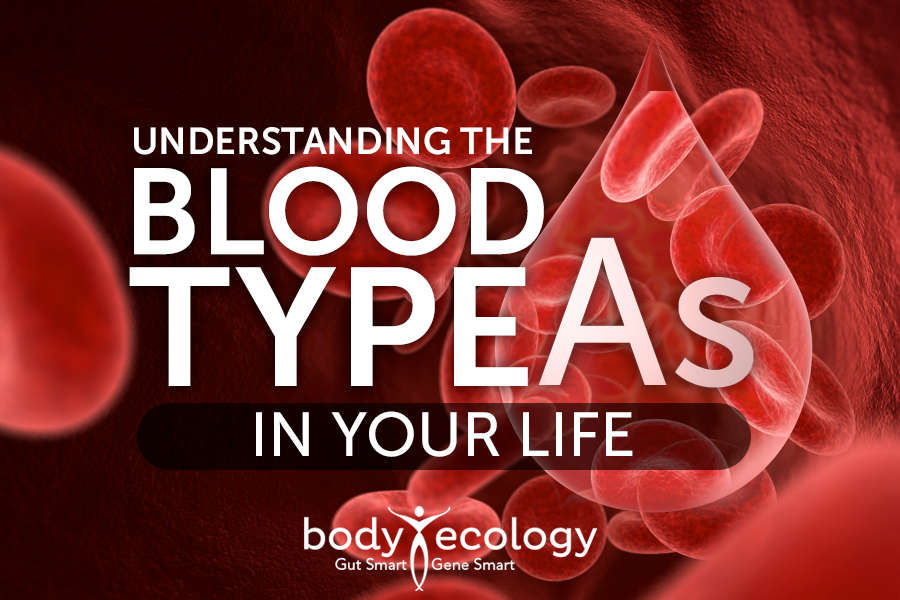
Body Ecology blood type series: Understanding the As in your life
In 1996, a new book was published that had the wellness community stand up and take notice. The book was called Eat Right for Your Type: 4 Blood Types, 4 Diets by Dr. Peter D’Adamo, ND.1 Dismissed as another fad diet or hailed as the next big breakthrough in nutritional science (depending on the expert), the book was almost immediately cloaked in controversy. It was updated in 2016.
Research in this area continues, but it’s based on the concept that the genetics contained within one’s blood type suggest a particular biochemistry that can reveal the basis for disease, healthy aging, fitness, and even emotional resilience.2
According to D’Adamo, knowing your blood type can give clues as to the most effective ways to optimize health and wellness.
Free download: Get the Body Ecology blood type ebook.
For example, blood type may determine your predisposition toward certain illnesses (including susceptibility to COVID).2 When understood, this can lead to learning ways to minimize those risks.
The author also shares recommendations for diet and/or specific foods related to blood type, along with the ideal approach to exercise for your type. Could there be a “shortcut” to reaching fitness goals by capitalizing on your blood type’s genetic potential?
Let’s begin our series by looking at blood type A.
All about As: Diet, exercise, personality & a whole lot more
The determinant factor in how blood types are categorized depends on which antigen the blood contains or does not contain:
- Antigens are made of molecules of various components, which can stimulate an immune response.
- Antigens found on the surface of red blood cells, when present, are either “antigen A” or “antigen B.”
- A protein called the Rhesus, or Rh, factor may also be found on red blood cell surfaces. (Rh factor is considered the “antigen D.”)
- The blood type system categorizes blood type according to whether or not the antigen D can be found on the surface of red blood cells.
- Positive blood contains the Rh factor on the surface of the red blood cells, but negative blood does not.
For example, let’s say you’re type A and Rh-positive. This means your blood type is A+ because the Rh factor in your blood can be found on the surface of the blood cell.
-
Blood type A personality.
Those with blood type A are known to be more sensitive to stress. This can be from too much stress from food, medicine, chemicals, hormones, and lifestyle. Stress may weaken immunity much more quickly than other blood types. Type As spend too much of their life in a “flight-or-fight” mode, which is counterproductive to healing. The body can’t heal unless it’s in a “rest-and-digest” state.
Elevated cortisol levels may affect personality:
- When cortisol levels remain chronically high, it may make us feel anxious and perfectionistic.
- We may find it difficult to truly relax and to enter the stages of deep sleep.
- Deep sleep is essential for building energy and for supporting healing.
Some Asian cultures believe in a direct link between one’s personality and blood type. Ketsueki-gata is the name for how the Japanese label this connection.
Similar to astrology in the West, many Japanese believe Ketsueki-gata to be associated with a particular type of disposition and the possessing of specific character traits, including how well-suited one person may be for another or whether someone is a fit for a particular job. It’s said to be a culture somewhat obsessed with blood type and personality.
Japan has a disproportionately high number of blood type As (about 57 percent) compared with other parts of the world.3
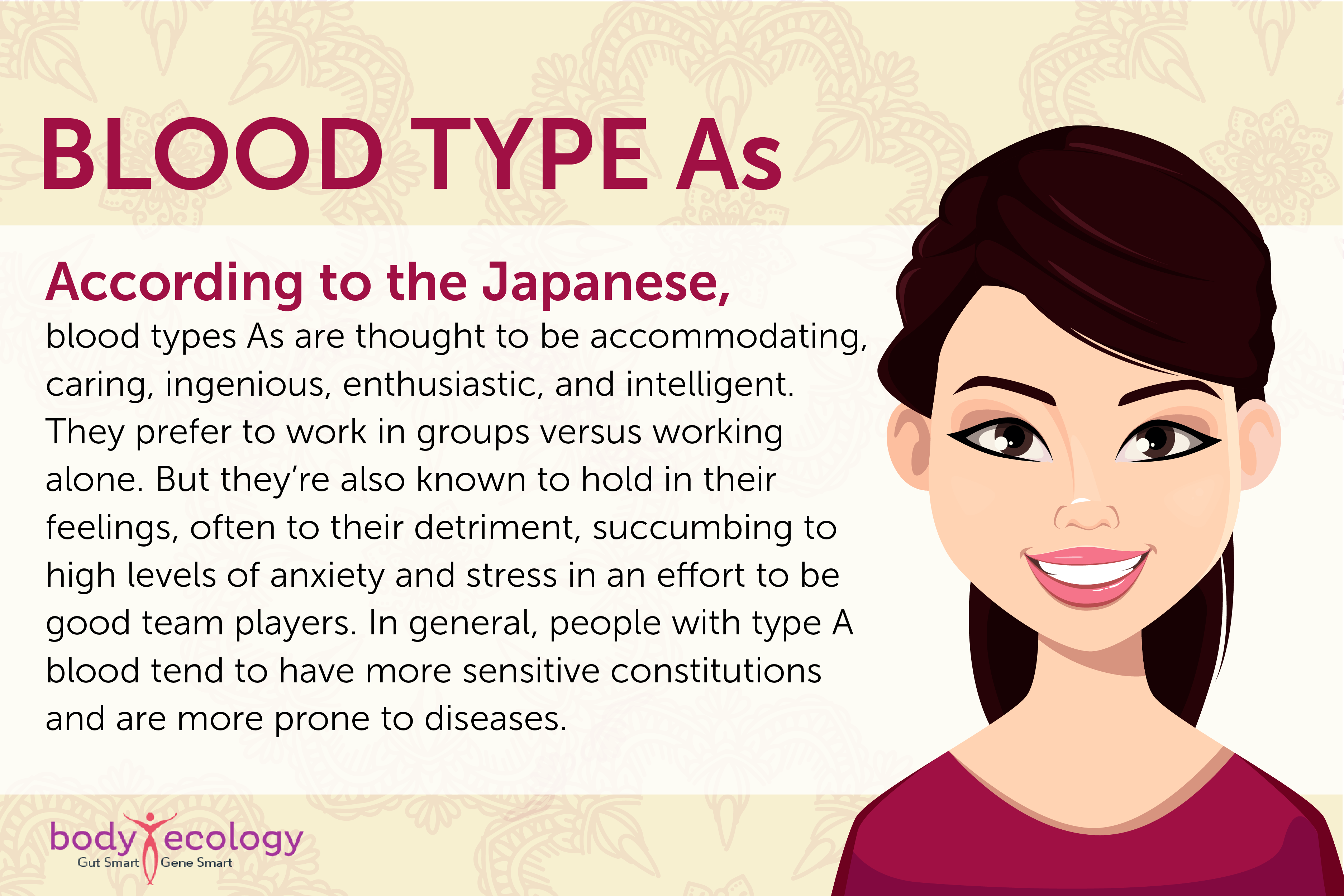
-
Blood type A exercise.
As the personality of blood type A would seem to indicate, exercise recommendations for this blood type center around stress reduction.4
From an evolutionary perspective:
- Type A genetics mimic those of farming cultures, who worked the land tending to their crops in an organized, methodical fashion without the need to evolve physical attributes that supported high-intensity or explosive movements.
- While continuously active, they engaged in activities that developed energy systems that predominantly support low-intensity movement.
Know thyself: Sign up here to find out what’s hiding in your DNA.
Sustained, moderate-to-high-intensity workouts raise cortisol levels — a stress hormone — and encourage the storage of fat around the midsection.
The biochemistry of type As makes it particularly difficult for their bodies to keep cortisol in balance. Furthermore, repetitive movements, over time, can make joints susceptible to damage — of particular concern to type As due to a genetic background that lacked the necessary stimulus, over time, to adapt to high-impact activities that place greater levels of “good” stress on the joints.
Therefore, type As benefit most from exercises that focus on low-impact activities requiring a reasonable amount of focus and offering a calming effect, such as walking (especially in nature), yoga, tai chi, and Pilates. These options are easier on the joints than some other forms of exercise and provide workouts that emphasize isometric contractions.
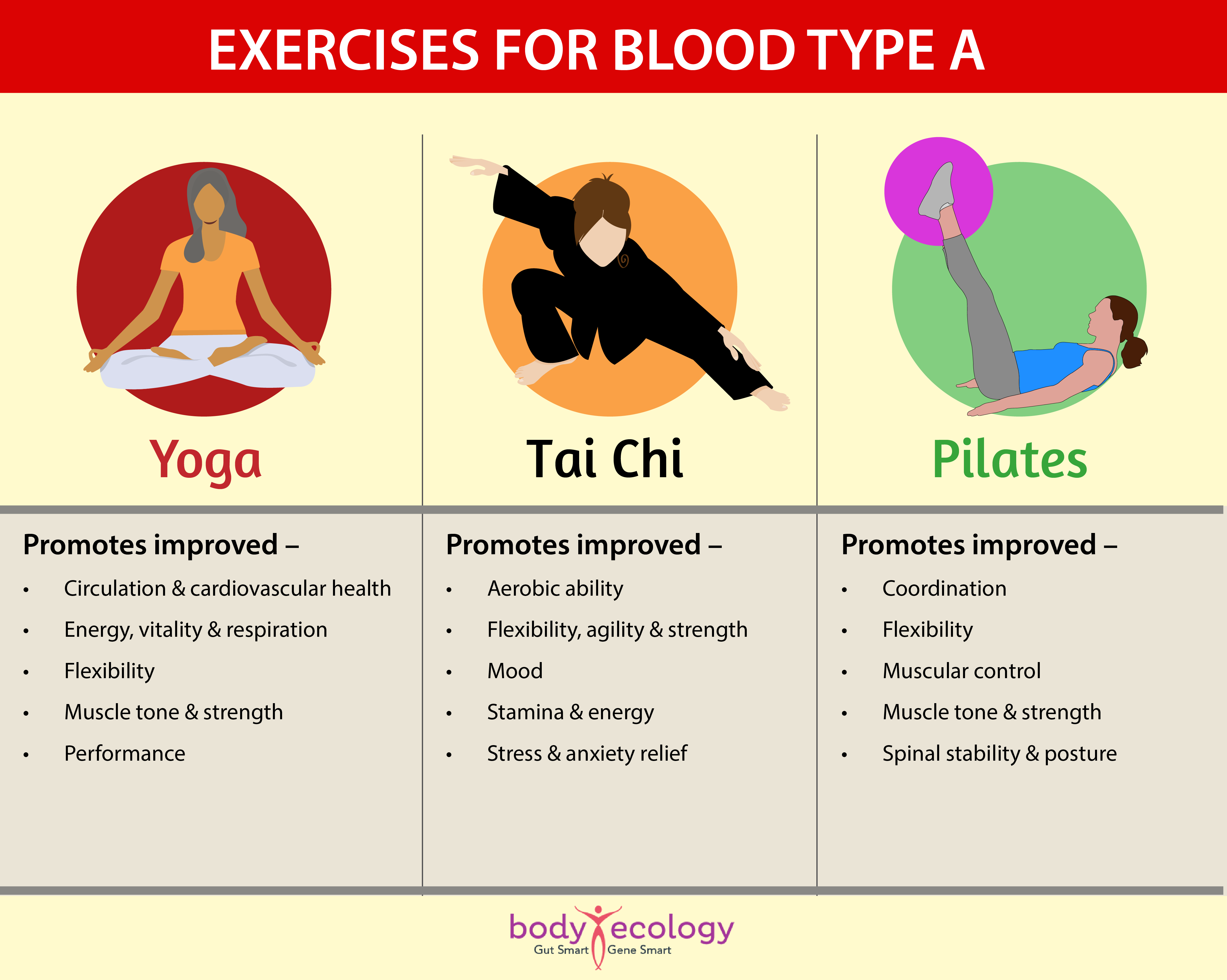
-
Blood type A diet.
Why or how can one’s blood type dictate the kinds of foods they should eat? The answer may be related to the food sources available to humans as we evolved in different parts of the world — and how our digestive systems and, ultimately, our genetics evolved based on the availability of certain foods.
However, medical research does not currently link a blood type A diet (or any type) to particular health benefits, at least where cardiometabolic conditions are concerned.5 More studies are needed.
That said, remember our discussion above about the antigens found in your blood that determine your type?
- Blood type is based on your body’s immune response related to the antigens it contains or does not contain. Appropriate immune response is critical in managing pathogens, like viruses, bacteria, toxins, and other stressors that can damage your immune system.
- With most of the immune system located in your gut, it’s important to make sure to provide the right environment in which healthy gut microbes can thrive, thus supporting immunity and helping to create energy.
- Antigens found on the surface of blood cells that create the human blood types have been linked to specific diseases in specific types.2 This area of study is in its infancy, but it’s clear that the microbiome plays a role, relative to the four blood groups.
A small study in Finland conducted in 2012 showed that different blood types could be associated with significantly varied microbiomes, particularly in terms of diversity.6 This indicated that targeted, nutritional interventions may be helpful in minimizing the risk of certain diseases.
Digestive system characteristics in those with blood type A include low stomach acid and digestive issues — more common earlier in life for blood type As, even from birth. Low stomach acid may not seem that problematic, but it is. When stomach acid (HCl) is low, you won’t digest proteins well, and you won’t extract minerals from your food. Type As should also take special care when eating animal proteins. You may become protein-malnourished, even if you’re getting adequate amounts of protein daily.
Low stomach acid may lead to amino acid and mineral deficiencies, as well as low B12.7 Digestive enzymes and fermented foods and drinks are pretty much mandatory for blood type As, to help maintain a healthy inner ecosystem and immune system. Fermented foods are an important part of the Japanese daily diet.
We’ve come to believe that while all nutrients are essential, minerals are needed in greater amounts than any other nutrient.
They’re critical to promoting the assimilation of protein, and they help keep our blood slightly alkaline so that viruses, fungi, bacteria, and cancer cells may not grow as easily.8 Of course, having said this, good fats are essential for assimilating minerals. Therefore, all the nutrients must be included in a blood type A diet each day, and this is doable when you eat the Body Ecology way.
Body Ecology’s Ancient Earth Minerals, available in liquid or capsules, provide an ideal foundation for mineral support — crucial in supplementing our food supply, which has been depleting minerals for decades through commercial farming techniques.9
When stomach acid is deficient, and you don’t digest protein, then cortisol will be elevated, and blood sugar (glucose) goes up too. Research shows that protein malnourishment elevates the stress hormone cortisol.10
Signs of protein malnourishment in children are poor muscle tone and swollen bellies, also a common symptom in autism (more on that below).
Correcting digestion is key:
- When cortisol is elevated, blood sugar also rises, and more minerals are required to bring the body back into balance.
- When glucose and cortisol are high, our blood becomes too acidic, allowing yeast and other infections to thrive.
- Minerals may be pulled from the bones and teeth, if necessary, to restore equilibrium, so this may contribute to osteopenia, osteoporosis, gum disease, and loss of teeth over time.11
- Minerals are also required for the assimilation of proteins. This will continue to exacerbate the low protein syndrome, so you have a vicious cycle.
Food recommendations for a blood type A diet include avoiding red meat and focusing on plant-based meals of fruits and vegetables, beans, and healthy grains.1 Those with blood type A tend to have sensitive immune systems and will benefit from the freshest, organic, plant-based foods. Fresh fish and miso soup are excellent sources of daily protein for the Japanese as well.
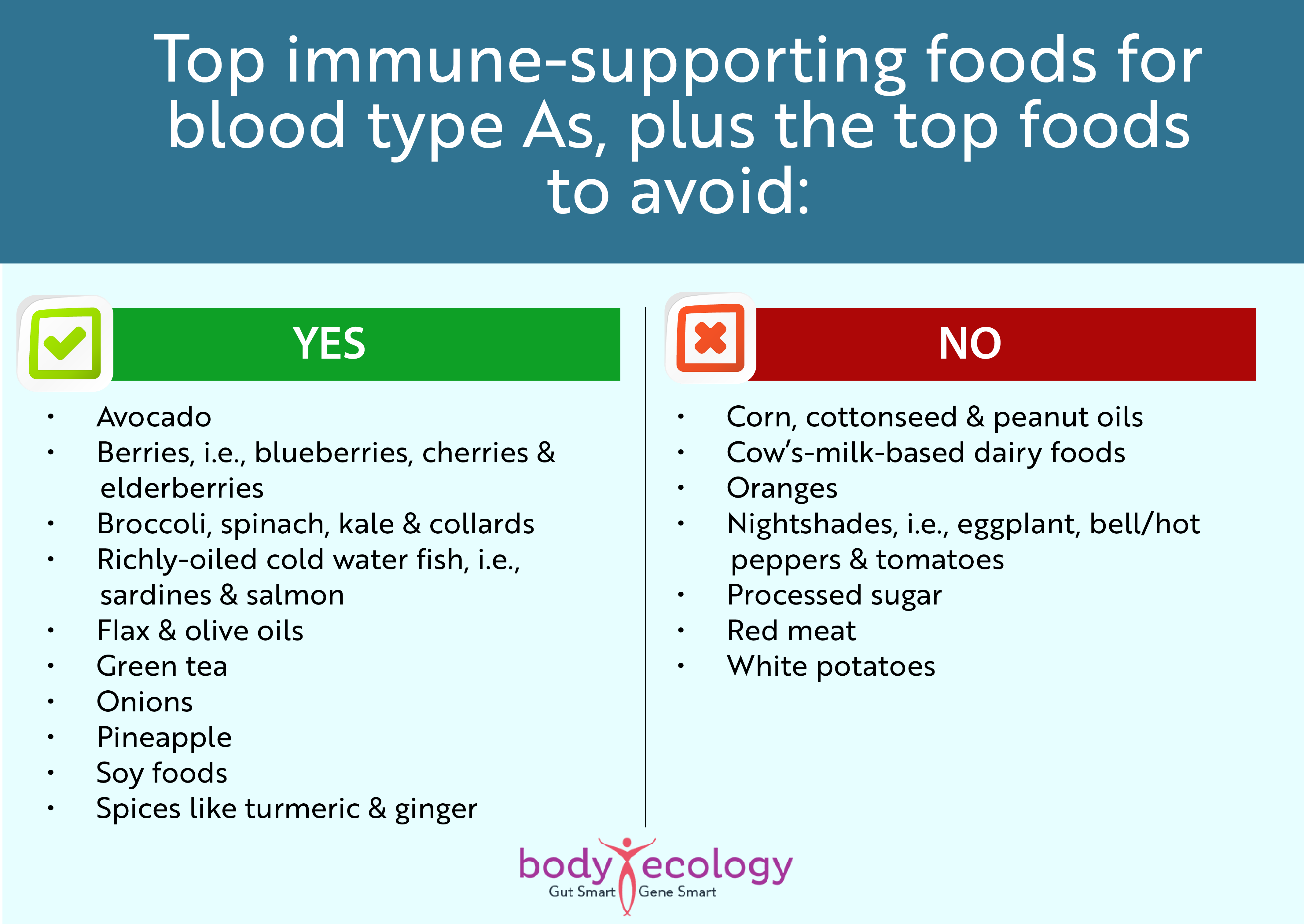
You can also download Dr. D’Adamo’s Blood Type Diet® app to get a more detailed list of the highly beneficial foods for As.
Donna’s note: I am an A and have followed much of the recommendations for As for nearly 40 years. I can eat larger amounts of animal protein, but I look, feel, and sleep better when I don’t. I’ve noticed when I work with As that the recommendation to eat fish, chicken, and turkey versus red meat is right.
Yeast and mold (both fungus) produce oxalates, and we also get them in our food. It’s very important to make modifications to your blood type A diet as needed. For example, foods like flax and walnuts are super beneficial for As, but eating walnuts would not be good for an A with a yeast or mold infection.
Peanuts are highly beneficial, but they are very high in oxalates. Pumpkin seeds are on the highly beneficial list as well and are lower in oxalates. With yeast and/or mold infections, one should be very mindful of the amount of oxalates they consume.
Oxalates are in many nutritious plant foods, and we shouldn’t be so sensitive to them. If you lack the Oxalobacter formigenes bacteria in your gut (killed off by antibiotics), you won’t have this “microscopic magician” consuming the oxalates in your food.
So, foods that would normally be considered healthy would not be for you. This is a perfect example of how you have to individualize your blood type A diet to the conditions you have currently. Of course, conquering the yeast or mold overgrowth is a must!
Type A and autism: Is there a link?
People with blood type A have the most sensitive blood type with respect to immune system sensitivity, frequent infection, and susceptibility to infection. Yeast infections are present in autistic children as well. It would therefore seem logical that children with blood type A would be more prone than other blood types to developing autism.
In my years of working with kids on the spectrum, I soon observed that eight out of 10 children on the autism spectrum have blood type A.12
However:
- A 2012 study looked at 440 children who visited a clinic in China for medical treatment from 2009 to 2011.13
- Information about these patients was collected in a database, including general information about the children’s parents for the purposes of conducting additional, related studies.
- The control population represented individuals donating blood between 2009 and 2011.
- The distribution of blood types in the control group was compared with data collected on the parents of children on the autism spectrum.
- No statistically significant differences were revealed.
This was a large study of 1,695, emphasizing the importance of big, collaborative studies that carry with them the ability to provide reliable conclusions. In time, more studies will delve further into the connection between blood type A and autism.
Elevated cortisol also depletes sexual hormones (estrogen, DHEA, progesterone, and testosterone), so we age faster.
When chronically elevated, cortisol and high blood sugar are often referred to as early-aging and even death hormones. Unfortunately, unless this problem is addressed and conquered, children with autism are destined to age quickly and may always be more susceptible to infections and hormone and sleep problems as they age.14
Knowing the special characteristics (and needs) of people with blood type A, it becomes easier to understand why autism may be more prevalent among this subset of the population. Their blood may be more acidic, their immunity may be weaker, their body may repair more slowly, and their inner ecosystems may be more susceptible to imbalances and dysbiosis.
The good news is that The Body Ecology System of Health and Healing, with our gluten-, casein-, and sugar-free diet rich in probiotic foods, is ideally suited to bring the body and the inner ecosystem of blood type A children and adults (and all blood types, for that matter) back into balance. This way of eating and living can help to starve an underlying yeast infection and build the immune system at the same time.
Check back for the next article in our series to get a top-to-bottom review of blood type B.
Free download: Get the Body Ecology blood type ebook.
REFERENCES:
- 1. DAdamo, Peter, and Catherine Whitney. Eat Right 4 Your Type (Revised and Updated): The Individualized Blood Type Diet® Solution. New American Library, 2016.
- 2. Ewald DR, Sumner SC. Blood type biochemistry and human disease. Wiley Interdiscip Rev Syst Biol Med. 2016;8(6):517-535. doi:10.1002/wsbm.1355.
- 3. Fujita Y, Tanimura M, Tanaka K. The distribution of the ABO blood groups in Japan. Jinrui Idengaku Zasshi. 1978 Jun;23(2):63-109. doi: 10.1007/BF02001790. PMID: 691841.
- 4. Mary Rogers, A.Ian Glendon, Blood type and personality, Personality and Individual Differences, Volume 34, Issue 7, 2003, Pages 1099-1112, ISSN 0191-8869, https://doi.org/10.1016/S0191-8869(02)00101-0.
- 5. Wang J, García-Bailo B, Nielsen DE, El-Sohemy A. ABO genotype, ‘blood-type’ diet and cardiometabolic risk factors. PLoS One. 2014 Jan 15;9(1):e84749. doi: 10.1371/journal.pone.0084749. PMID: 24454746; PMCID: PMC3893150.
- 6. Mäkivuokko H, Lahtinen SJ, Wacklin P, et al. Association between the ABO blood group and the human intestinal microbiota composition. BMC Microbiol. 2012;12:94. Published 2012 Jun 6. doi:10.1186/1471-2180-12-94.
- 7. Saltzman JR, Kemp JA, Golner BB, Pedrosa MC, Dallal GE, Russell RM. Effect of hypochlorhydria due to omeprazole treatment or atrophic gastritis on protein-bound vitamin B12 absorption. J Am Coll Nutr. 1994 Dec;13(6):584-91. doi: 10.1080/07315724.1994.10718452. PMID: 7706591.
- 8. Nazanin Rohani, Liangliang Hao, Maria S. Alexis, Brian A. Joughin, Konstantin Krismer, Mira N. Moufarrej, Anthony R. Soltis, Douglas A. Lauffenburger, Michael B. Yaffe, Christopher B. Burge, Sangeeta N. Bhatia and Frank B. Gertler. Acidification of Tumor at Stromal Boundaries Drives Transcriptome Alterations Associated with Aggressive Phenotypes. Cancer Res April 15 2019 (79) (8) 1952-1966; DOI: 10.1158/0008-5472.CAN-18-1604.
- 9. Brian Halweil. “Still No Free Lunch: Nutrient Levels in U.S. Food Supply Eroded by Pursuit of High Yields.” The Organic Center, Sept. 2007.
- 10. Ashraf T. M. Soliman. Serum Cortisol Concentrations in Children with Protein-Energy Malnutrition. Annals of Saudi Medicine. Volume 9, Issue 6, November 1989.
- 11. Chiodini I, Mascia ML, Muscarella S, Battista C, Minisola S, Arosio M, Santini SA, Guglielmi G, Carnevale V, Scillitani A. Subclinical hypercortisolism among outpatients referred for osteoporosis. Ann Intern Med. 2007 Oct 16;147(8):541-8. doi: 10.7326/0003-4819-147-8-200710160-00006. PMID: 17938392.
- 12. Noted by Donna Gates, who documented this when she began to work with children with autism. Jeffrey Bland, MD, noted the same from a review of his files and stated it during a DAN conference.
- 13. Wu ZT, Zhang W, Zhang SQ, et al. Lack of association between parental ABO blood type and autism spectrum disorders. CNS Neurosci Ther. 2012;18(7):604-605. doi:10.1111/j.1755-5949.2012.00342.x.
- 14. Emma K. Baker, BPsySc Hons, Amanda L. Richdale, PhD, Sleep Patterns in Adults with a Diagnosis of High-Functioning Autism Spectrum Disorder, Sleep, Volume 38, Issue 11, 1 November 2015, Pages 1765–1774, https://doi.org/10.5665/sleep.5160.

